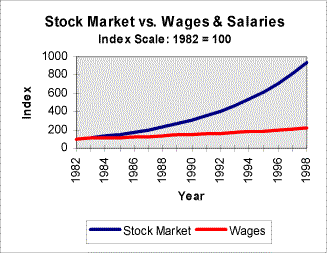| ............. |
This article was posted on April 10, 1998.
This past week CNBC showed a graph similiar to the one below depicting how much the stock market has increased since 1982 and how little the average person's salary had grown during the same period. Kind of makes one wonder about the relative merits of going in to the office every day or staying home and watching CNBC.

Since I retired at age 38, have stopped "going into the office" and have on occasion watched CNBC all day when I'm not playing golf or travelling, I believe I can offer some perspective on this question.
-
You probably have to work a little.
Unless you win the lottery or receive a large inheritance, you'll probably have to work for some period of time to build up enough accumulated capital to live on. The trick is to find something you like doing and to avoid expending time and energy on activites with low rates of return.
-
Working uncompensated overtime to "impress the boss" usually has a low rate of return.
While I prided myself on never working more than 40 hours a week, I observed that few of my colleagues that worked nights and weekends to "kiss up to the boss" were financially rewarded. Whether this is the result of "downsizing", "discrimination", or good old "office politics" is largely irrelevant. With less than 10% of the employees who "work for free" receiving big raises or promotions, it's clear that 90% of workers could easily find more productive uses for their time and energy. In today's workplace, most employees would be better off just doing what's required to keep their jobs. Leave the "fluff" to somebody else.
-
Time spent learning about financial planning and managing your own retirement assets has a very high rate of return..
I believe most employees will find that spending 5 to 10 hours a week managing their personal financial assets has a much higher return than spending 5 to 10 hours a week in "uncompensated overtime." (Particularly efficient employees may even be able to fit these 5 to 10 hours into their regular 40 hour work week.) Working for free is rarely productive. Unless you're Bill Gates or Michael Jordan, the small amount of time required to learn about financial markets combined with the fees and commissions you'll save because you're in a position to manage your own assets should make these your most highly compensated hours of the year.
|

![[Retire Early]](retire.gif)